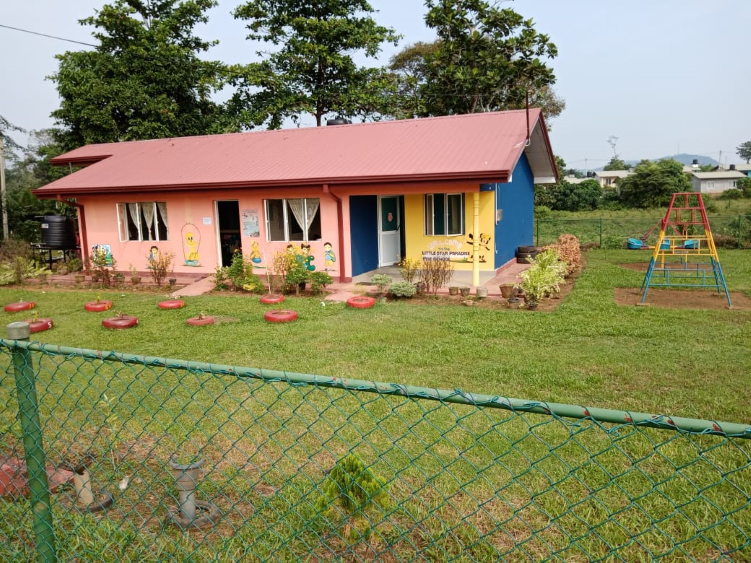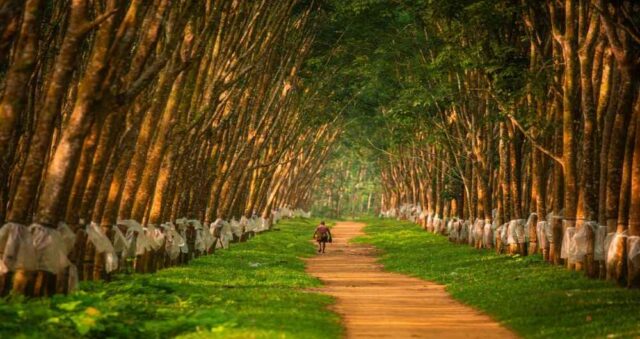
Set against the beautiful backdrop of Kalutara’s lush tropical greenery, Neuchatel Estate remains a timeless tribute to the diversity of Sri Lanka’s plantation heritage. Founded in 1904 by British planter Colin Cowper Mee—who named the estate after his alma mater in Switzerland—Neuchatel quickly emerged as a beacon of progress.
In addition to being a skilled planter, Cowper Mee was also an enthusiastic equestrian, a generous supporter of the Ceylon Turf Club and an influential member of the Ceylon Planters’ Association, whose vision set in motion a legacy that would evolve over decades. Following his death in 1909, the estate passed to his siblings and later transitioned through colonial management, a takeover by Aitken Spence in 1942, government nationalization in 1975, and privatization under Horana Plantations PLC in 1992, which is under Hayleys Group. Even today, 121 years later, this legacy continues to thrive, with even Cowper Mee’s original horse-training tracks having been preserved into the present day.
One of the estate’s significant milestones was its transition from tea to rubber. By 1928, rubber cultivation had expanded significantly in the Kalutara district and Neuchatel dedicated 2,200 acres to the crop. By 1996, tea cultivation ceased entirely, making way for more rubber plantations. A new era began in 2013 when oil palm was introduced as the second-largest crop on the estate, covering 124 hectares.

Today Neuchatel estate stands out as one of Sri Lanka’s most vibrant multi-crop estates spanning 902 hectares and cultivating crops including rubber, oil palm, coconut, and cinnamon, as well as tropical fruits like Rambuttan. In 2018, Neuchatel Estate began diversifying its crops by introducing cinnamon and coconut cultivation. Currently, this diversification spans across the Home Division, Horahena Division, Dikhena Division, Kokhena Division, and Tempo Division, covering a total of 93.00 hectares of coconut and 30.00 hectares of cinnamon. This strategic move has led to the generation of significant new income for the estate.
Innovation and Sustainability in Plantation Management
Neuchatel Estate has smoothly integrated modern technology with traditional practices to ensure long-term sustainability with an emphasis on efficiency and accuracy. The adoption of digital weighing systems, for instance, has replaced outdated methods for measuring latex yield, while advanced production facilities—such as forced air-drying towers and natural drying lofts—enhance product quality.
The estate’s commitment to environmental stewardship is underscored by its compliance with the European Union Deforestation Regulation Certificate, a first for a plantation in Sri Lanka. Sustainable practices like beekeeping, rainwater harvesting, and soil conservation are actively implemented to preserve the estate’s ecological balance.
Community Welfare and Workforce Development
Neuchatel Estate is more than a plantation; it is a thriving community. With a population of 2,140 and a predominantly a female workforce, the estate has implemented numerous initiatives to boost worker welfare—from revenue-sharing models and work opportunities to mid-day meal provisions and performance recognition programs.
The on-site Neuchatel Estate Hospital, along with regular health camps and educational programs, ensures that the well-being of workers and their families remains a top priority. The estate’s Child Development Center, recognized as one of the best in the region in the recent past, provides critical early childhood education and childcare services, securing a brighter future for the next generation.
A Future-Ready Approach to Sustainable Agriculture
In an era where sustainability is paramount, Neuchatel Estate has embraced innovative agricultural practices to maintain soil fertility and secure water resources. Rainwater harvesting provides a reliable water source for agricultural operations, while soil conservation techniques—especially within Oil Palm plantations—prevent erosion and maintain soil health.
In recent years, the Estate has also sought to build on its legacy as a pioneer in plantation innovation, with the establishment of bee keeping projects across the estate. These remarkable initiatives have enabled improved crop yields from improved pollination, while also generating valuable supplementary income for workers and the communities. Neuchatel Estate exemplifies the perfect blend of history, innovation, and sustainability. As it continues to evolve, the estate upholds its legacy of excellence in Sri Lanka’s Plantation Sector—proving that tradition and progress can coexist.



